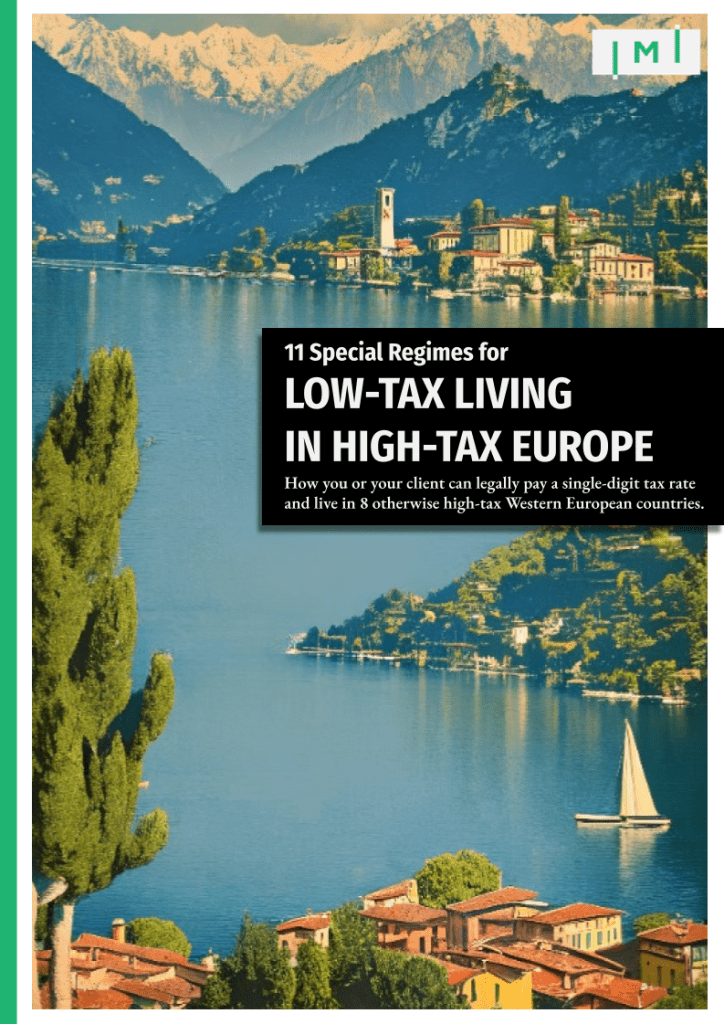Italy’s Representative Office Visa: The No-Investment, No-Presence Path to Italian Residency
If you’re a regular reader of IMI, you’ve already heard about Italy’s “Dolce Visa”, the Elective Residence Visa, and likely also the country’s inclusive citizenship by descent policy. Moreover, you are probably also familiar with Italy’s three special tax regimes, each of which can allow you to pay a single-digit tax rate while living in one of the world’s greatest countries.
In the below article, however, Italian tax advisor and immigration specialist Nicoló Bolla introduces the Italian Representative Office Visa, a little-known but highly effective and flexible path to residency in Italy.

Nicolò Bolla
Italy
Expanding business operations into a foreign country can be rewarding, and Italy is an attractive destination for many international companies. To facilitate such endeavors, Italy offers the Representative Office Visa (ROV), which allows foreign businesses to establish a presence in the country without engaging in commercial activities. This article explores the essential aspects of Italy’s ROV, its eligibility requirements, the application process, and the benefits it offers foreign enterprises.
The ROV enables foreign companies to set up a non-commercial office in Italy. The Italian Immigration code allows the company’s director – or anyone appointed to the Italian representative office – to obtain a Type D Schengen visa (long-term) on the grounds of being seconded/assigned to the Italian representative office.
Eligibility Criteria for the Italian Representative Office Visa:
To be eligible for the ROV, the foreign company must:
- Be a limited company
The company must be a legal entity limited by shares or by guarantee. Partnerships, associations, charities, etc. are excluded. - Have trading status
The company must be active and trading. Consequently, companies under liquidation or bankruptcy procedures are ineligible. - Show financial stability
The foreign company should demonstrate financial stability and the accounts filed with the local companies registry must be up-to-date; - Be domiciled in a WTO country
The foreign company must be incorporated in a country belonging to the World Trade Organization.
Application process for Italy’s Representative Office Visa
The first step is to create a representative office in Italy and register it at the Italian Chamber of Commerce. To do so, you must obtain a certificate of good standing from the foreign companies registry stating the following information:
- company name
- registered address
- director’s name
- business activities carried out
Upon obtaining the sworn translation of such a certificate, the company must apply to the local tax office for the Director’s and the company’s codice fiscale (National Insurance Number), so it can finally be registered at the local Chamber of Commerce.
Once the representative office is registered, you must obtain three clearances from three different entities:
- The Chamber of Commerce
- The Department of Labor
- The Immigration Office
Each office checks and confirms the eligibility criteria for the ROV. The final step in this process is to obtain the nulla osta (certificate of no impediment) from the Italian Immigration Office, allowing you to apply for the type-D visa at the Italian consulate in the foreign jurisdiction you reside.
Once you secure your initial year-long visa and convert that into a temporary residence permit once in the country, you can settle in Italy. You must then renew the visa once a year. In the fifth year, you can convert the temporary residency into a permanent one.
To renew the temporary ROVs once a year, you must show a worldwide taxable income exceeding the minimum Italian welfare payment (currently EUR 6,542). This amount increases by 50% for your spouse and by 20% for each dependent child. The income may be of a foreign or domestic source, and can take many forms. The foreign company must also remunerate its representative office appointee with at least EUR 8,500 a year. Crucially, however, demonstrating that you maintained an active representative offices is not among the criteria for renewal.
Benefits of the Representative Office Visa
The ROV has multiple advantages over other Italian programs:
- You don’t need to invest any amount of money to qualify
There is no need to invest specific amounts in Italy to qualify for the ROV. Even expenses related to the office lease are limited because, once the visa is obtained, there is no need to maintain the representative office. - Your foreign company is not subject to Italian tax
Because your foreign company only maintains a representative office in Italy, rather than a so-called Permanent Establishment, the foreign-domiciled corporation that established the office does not become subject to tax in Italy. - You don’t need to keep the representative office active to renew the residence permit
Approval of the visa renewal applications is not contingent on keeping the office but on the individual’s having paid tax above a (modest) threshold. - Your spouse and children can apply for a family reunification visa from within Italy
Your family can enter Italy on any type of visa, such as a tourist visa, and apply for a residence permit based on family reunification once in Italy. - This visa falls outside of the quota system
Many other visa types, including the Elective Residence Visa, are subject to annual intake quotas. This is not the case for the ROV.
Note also that the ROV, unlike the Elective Residence visa, imposes no physical presence requirements in Italy.
The ROV, in essence, represents a compelling alternative to income- or investment-based visas in Italy. Not only are investments altogether unnecessary, the non-taxable status of the representative office even precludes any tax liability on the part of your foreign company. The absence of a requirement to keep the office active once the initial visa is approved makes the ROV an exceptionally flexible path to residency.
Read also:
11 Special Regimes for
Low-Tax Living in High-Tax Europe
How you or your client can legally pay a single-digit tax rate and live in eight otherwise high-tax Western European countries.
The report is for those attracted to Western Europe for its lifestyle proposition but deterred from residing there full-time by high levels of taxation.
The report will show how you (or your client), by participating in special tax regimes that Western European governments have expressly designed to soften the fiscal blow for foreigners, can have your cake and eat it too.
After moving back to Italy from the United States in 2013, Nicolo realized how much an accounting and tax firm was needed to help expats living in Italy to comply with the local tax regulations. That’s when he started Accounting Bolla, a company with a very simple, yet utopian mission: To make Italian taxes easy and manageable.
Since 2017, Accounting Bolla has helped thousands of clients optimize their taxes and safely invest in Italy.



